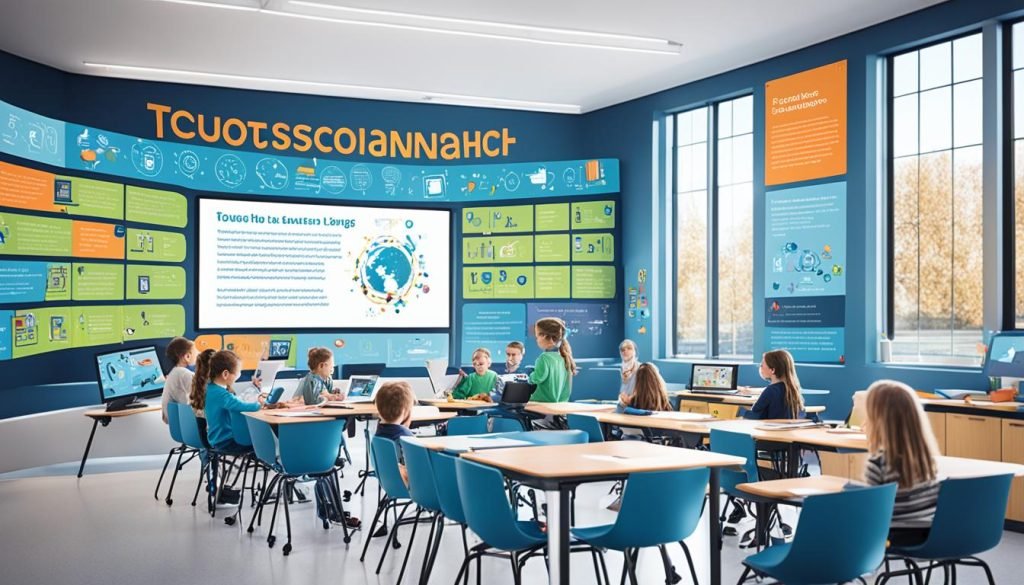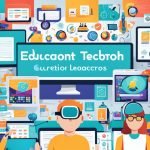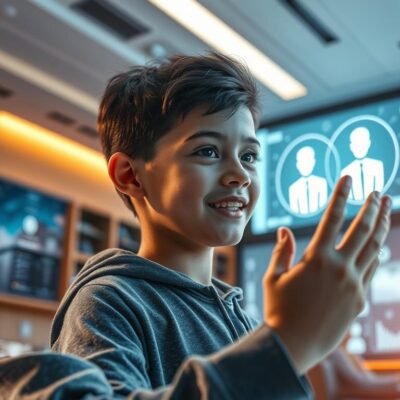We’re moving into a world where technology and changing values are reshaping education. The future of education looks bright and exciting. Experts believe that tech will change how we learn, making learning more personal for everyone.
This journey into the future shows how online tools, AI, and immersive tech are changing education. They’re making learning better for all kinds of students around the world.
Key Takeaways
- The landscape of education is evolving, driven by technological advancements.
- Personalized learning is becoming a fundamental aspect of education.
- Online learning platforms are increasingly popular in today’s society.
- Artificial intelligence is set to revolutionize educational experiences.
- Continuous learning and upskilling are essential in today’s job market.
- Immersive technologies will enhance student engagement and effectiveness.
Emerging Trends Shaping the Future of Education
The way we learn is changing fast, thanks to new trends. Online learning is getting more popular, making education flexible and accessible worldwide. Now, schools are mixing in-person and online learning to meet different learning styles. It’s key for schools to teach digital skills to get students ready for a tech-filled future.
The Rise of Online Learning Platforms
Online learning has changed how we get education. These platforms let learners study anytime, anywhere, without limits. With the world facing big changes, more people are turning to online learning. Big names like Coursera, edX, and Udemy are leading the way with lots of courses.
This growing demand is expected to make the online education market grow even more.
Hybrid Learning Models
Hybrid learning combines traditional classrooms with online learning. It offers a flexible way to learn that suits students and teachers. By using technology and face-to-face time, schools can make learning more personal.
This method is becoming more popular as teachers look for new ways to keep students interested.
Increased Focus on Digital Literacy
Technology is everywhere, making digital skills essential. Schools are working to make students better at using digital tools. They’re teaching more than just basic computer skills. They’re focusing on critical thinking, online communication, and checking information.
This focus on digital literacy helps students deal with a world full of technology.
The Role of Artificial Intelligence in Education
Artificial intelligence is changing how we teach and learn. It brings new ways to make learning better for each student. By using AI, schools can give students learning that fits their needs. This leads to better engagement and success in school.
AI-Enhanced Personalized Learning Experiences
AI makes learning personal by adjusting to what each student likes and needs. This way, students can learn at their own speed. They understand and remember more because of it. The Gates Foundation found that personalized learning improves how well students do and how happy they are.
Intelligent Tutoring Systems and Adaptive Curricula
Intelligent tutoring systems use AI to check how well students are doing right away. They give support and resources that fit what each student needs. This helps students learn better and stay interested in their studies.
Streamlining Administrative Tasks through AI
AI helps make school work more efficient by doing tasks like grading and planning lessons. This means teachers can spend more time helping students. Schools become better places for both teachers and students because of this.

Future of Education: Lifelong Learning and Upskilling
The future of education is all about lifelong learning and upskilling. Job markets change fast, making continuous learning key. People must keep improving their skills to keep up in their careers. Old ways of learning won’t prepare us for the future job markets.
Importance of Continuous Learning in a Rapidly Changing Job Market
Many workers know they need to keep learning to grow in their careers. Technology moves fast, making old skills outdated quickly. Upskilling helps people move into new roles or industries easily. Companies want people who keep learning, seeing them as great assets.
Emergence of Formal Lifelong Learning Programs
Education is now offering formal lifelong learning programs. These programs help a wide range of learners keep learning. They offer:
- Flexible scheduling for those who work.
- Customized curricula for specific industries.
- Access to expert instructors with real-world experience.
These programs create a culture of lifelong learning. They get people ready for the future job markets, helping them grow in their careers.

| Benefits of Lifelong Learning | Impact on Career |
|---|---|
| Enhanced skill set | Increased job opportunities |
| Adaptability to change | Higher earning potential |
| Networking opportunities | Career advancement |
| Ongoing personal development | Improved job satisfaction |
Immersive Learning Experiences Through Technology
The way we learn is changing fast, thanks to technology. Now, immersive learning is becoming more common. This is because of virtual and augmented reality in schools. These tools make learning fun and interactive, helping students grasp tough topics better.
The Impact of Virtual and Augmented Reality in Classrooms
Virtual reality lets students go on virtual field trips and explore labs in a new way. Immersive learning like this helps students remember what they learn. They can visit places they might not see in real life, like ancient cities or the ocean.
Augmented reality adds digital info to the real world, making lessons more fun and real. Together, VR and AR make students more involved than old teaching methods.
Gamification of Learning for Enhanced Engagement
Gamification makes learning fun and engaging. It adds game elements to school work, making students more excited to learn. With things like points and badges, students want to learn more.
This makes learning fun and builds a positive view of school. Combining immersive learning with gamification helps all kinds of learners. It makes education more effective.
| Technology | Benefits | Applications |
|---|---|---|
| Virtual Reality | Enhances immersion and engagement | Virtual field trips, interactive simulations |
| Augmented Reality | Enriches real-world experiences | Interactive lessons, enhanced visuals |
| Gamification | Boosts motivation and participation | Game-based learning, challenges, and quizzes |
Conclusion
The future of education is set to be shaped by big changes and a focus on new ideas. Online learning has opened doors for more students, offering unique learning paths. Trends like hybrid models and digital skills are here to stay, changing how we teach and learn.
AI and immersive tech are also changing education. They make learning more personal and help students in new ways. This shows we need to keep working on making sure everyone has access to good education.
Learning throughout life is key to keeping up with new jobs and tech. By focusing on this, we can make sure education prepares people for the future. It will also help create a brighter, more welcoming world for everyone. The future of education is full of hope, excitement, and growth.





